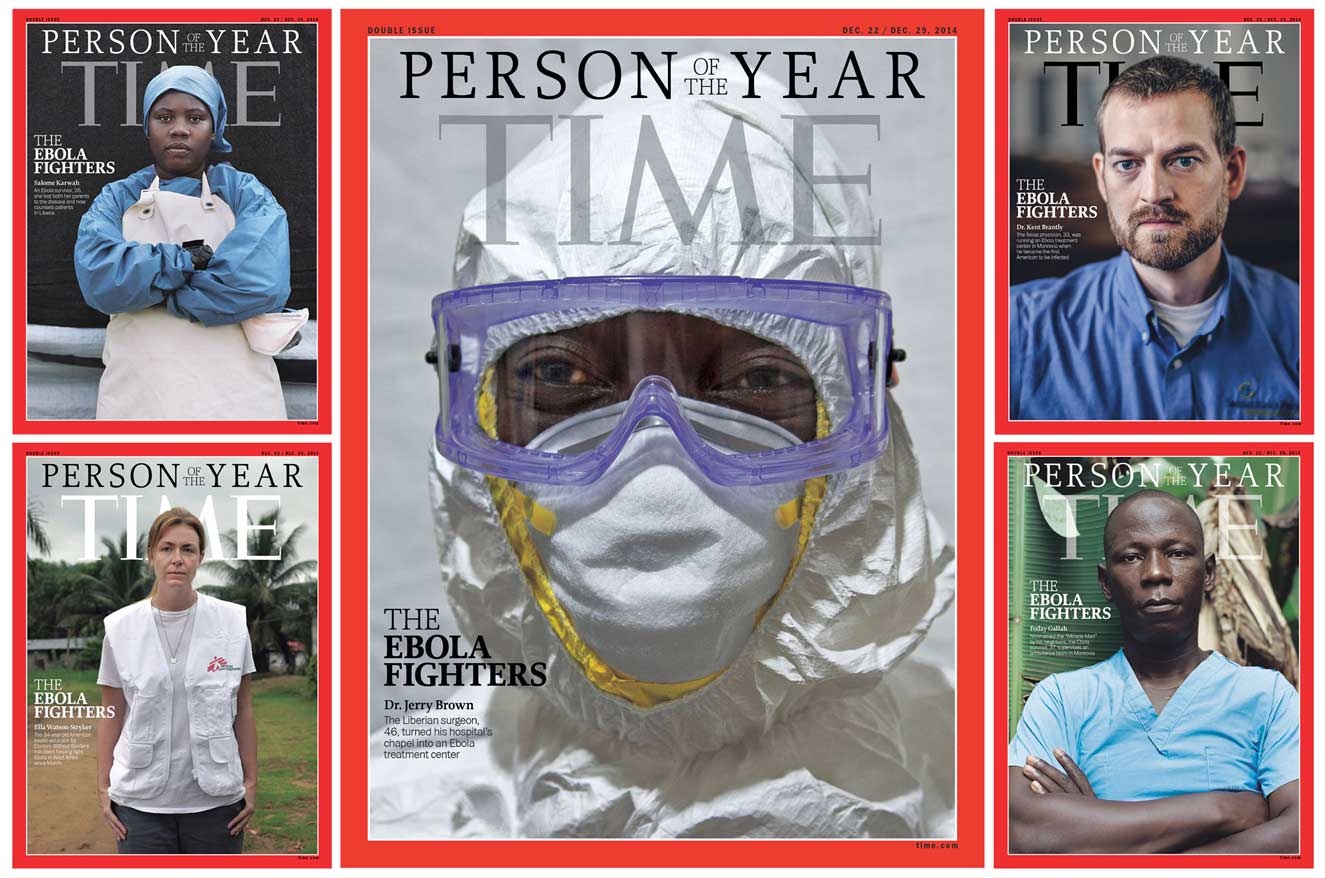
The Ebola epidemic brought on the best and worst in people this year. The best was recognized by Time Magazine, who designated The Ebola Fighters as "The Person of the Year."
The ones who answered the callIt also brought out the worst or, at least, the most mendacity in people. Follow over the jump for how misinformation about Ebola was recognized as the lie of the year and which person spreading that misinformation was recognized as singled out for doing so.
By David von Drehle, with Aryn Baker / Liberia
Dec. 10, 2014
On the outskirts of Monrovia, the capital of Liberia, on grassy land among palm trees and tropical hardwoods, stands a cluster of one-story bungalows painted cheerful yellow with blue trim. This is the campus of Eternal Love Winning Africa, a nondenominational Christian mission, comprising a school, a radio station and a hospital. It was here that Dr. Jerry Brown, the hospital’s medical director, first heard in March that the fearsome Ebola virus had gained a toehold in his country. Patients with the rare and deadly disease were turning up at a clinic in Lofa County—part of the West African borderlands where Liberia meets Guinea and Sierra Leone. “It was then that we really started panicking,” says Brown.
Even in ordinary circumstances, the doctor’s workday was a constant buzz of people seeking answers: Can you help with this diagnosis? Would you have a look at this X-ray? What do you make of this rash? Inevitably, Brown would raise his eyebrows and crease his forehead as if surprised that anyone would think he might know the answer. Just as inevitably, he would have one.
Ebola was different. On this subject, Brown had more questions than answers. He knew the virus was contagious and highly lethal—fatal in up to 90% of cases. But why was it in Liberia? Previous Ebola outbreaks had been primarily in remote Central Africa. Could the disease be contained in the rural north? The membrane between countryside and city in Liberia was highly porous; people flowed into Monrovia in pursuit of jobs or trade and flowed back to their villages, families and friends. “Sooner or later,” Brown remembers thinking, “it might reach us.” And what then? A poor nation still shaky after years of civil war, Liberia—population 4 million-plus—had just a handful of ambulances in operation. How could Liberia possibly deal with Ebola?
First, Politifact's 2014 Lie of the Year: Exaggerations about Ebola By Angie Drobnic Holan, Aaron Sharockman on Monday, December 15th, 2014 at 3:08 p.m.
Thomas Eric Duncan left Monrovia, Liberia, on Sept. 19, for Dallas. Eleven days later, doctors diagnosed Duncan with Ebola.Media Matters for America singled out the Misinformer Of The Year: George Will.
Eight days after that, he was dead.
Duncan’s case is just one of two Ebola-related fatalities in the United States, and since Duncan traveled to Dallas, more Americans -- at least nine, and likely many more -- have died from the flu.
Yet fear of the disease stretched to every corner of America this fall, stoked by exaggerated claims from politicians and pundits. They said Ebola was easy to catch, that illegal immigrants may be carrying the virus across the southern border, that it was all part of a government or corporate conspiracy.
The claims -- all wrong -- distorted the debate about a serious public health issue. Together, they earn our Lie of the Year for 2014.
When PolitiFact awarded its 2014 Lie of Year to "exaggerations about Ebola," they cited Will as a prime example. Will used his Fox News platform to spread lies about the disease, falsely claiming that it could be "spread through the air." As PolitiFact noted:Thirty years ago, I was a big fan of Will's. Now, I have decided that he is no longer worthy of my attention.
Will's claim that Ebola could spread through the air via a cough or sneeze shows how solid science got misconstrued. The conservative commentator suggested a thought shift about how the virus could spread. In reality, Will simply misunderstood scientists' consistent, albeit technical explanation.Will has a long history of pushing misinformation, but it finally caught up with him in 2014, tarnishing the reputation as a public intellectual he had spent decades cultivating. He started the year one of the most respected members of the conservative media elite, and ended it with hundreds protesting his speeches. For this reason, Media Matters recognizes George Will as the 2014 Misinformer of the Year.
Ebola spreads through direct contact with bodily fluids such as blood, vomit and diarrhea. Coughing and sneezing are not symptoms.
As for that "big backlog of Ebola news" I mentioned in Social media tracking Ebola and fighting air pollution, posting that will wait for another day.
No comments:
Post a Comment